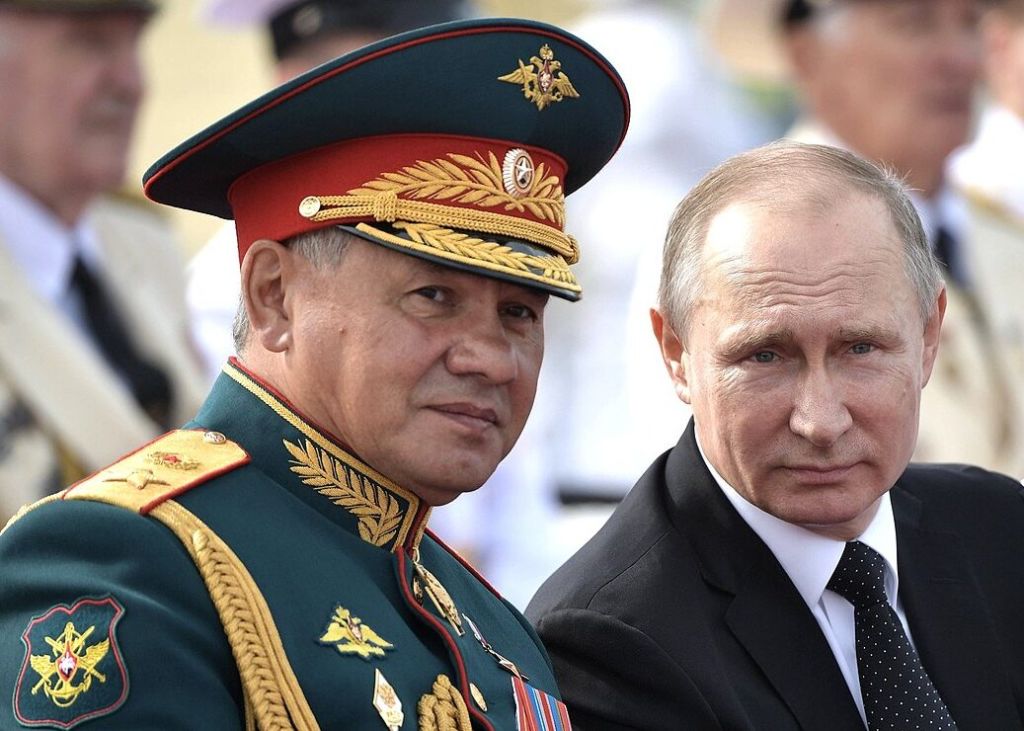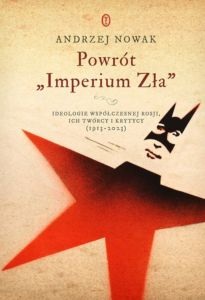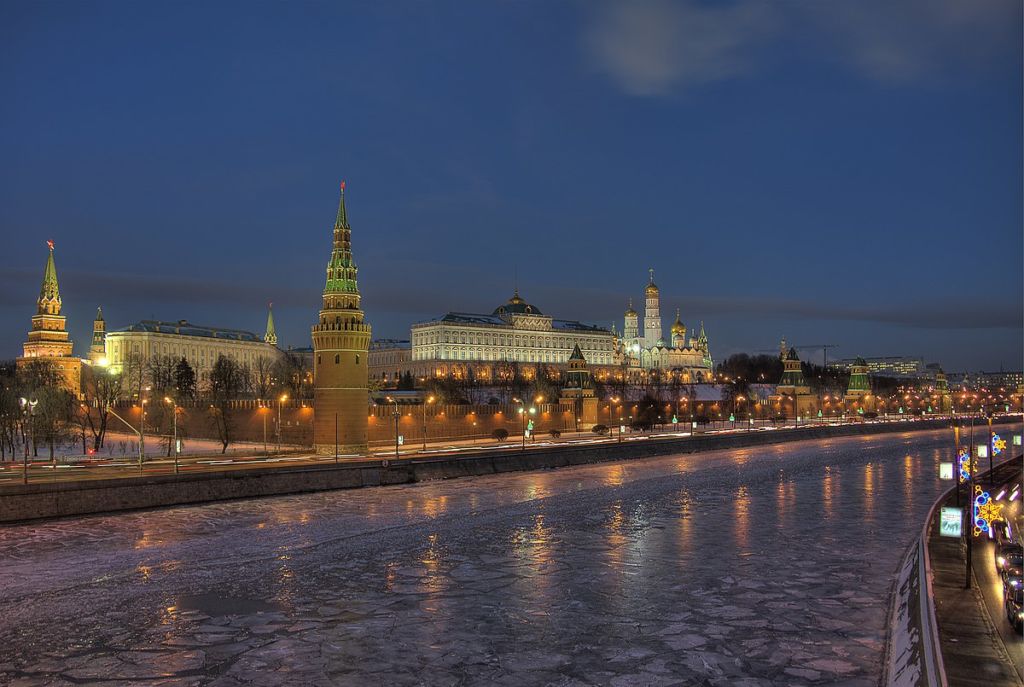The following was originally published in Polish in July 2023 in the Do Rzeczy weekly magazine. This translation was published at the English-language Polish conservative site Sovereignty.pl.
In 2002, Vladimir Putin was asked in an interview how the Russia he rules differs from the Soviet Union of Stalin’s time. The questioner’s intention was obviously to show that the times of bloody dictatorship in Russia were past, and that its present and future were times of freedom and democracy. In a conversation with the same reporter in 1991, Putin had warned with a sad face of a possible “return to totalitarianism.” 11 years later, when he had become the country’s President, he again put on a sad face, albeit for a completely different reason. He noted that compared to the Stalin era, Russia “has become much smaller, unfortunately.” Professor Andrzej Nowak’s latest book The Return of the “Evil Empire”: Ideologies of Modern Russia, Their Creators and Critics (1913–2023) (Powrót »Imperium Zła«. Ideologie współczesnej Rosji, ich twórcy i krytycy (1913‑2023)) begins with a reflection on those two revealing remarks.
Putin as a faithful disciple of Stalin
It was not sympathy for the Communist system, but indeed regret for Russia’s lost territories that led Putin to regard the collapse of the USSR as the greatest geopolitical disaster of the twentieth century. The invasion of Ukraine is an attempt to partially reverse this “disaster.” As Nowak notes, although Russia is the world’s largest country, Russians (and not just Putin himself) still want more and more land — not so much land to conquer as, according to the official narrative, land to “recapture” or “liberate.” This is traditional Russian rhetoric. After all, it is not only the Kremlin propagandists, but also seemingly serious historians from Pushkin’s homeland who argue that Russia has never invaded anyone. It has always only defended itself against external aggression, generally from the West. From the time of medieval Prince Alexander Nevsky, who fought German and Swedish knights, through the popular uprising against “Polish interlopers” in the early seventeenth century and two patriotic wars (first against Napoleon, then Hitler), to the clash with the “collective West” (the United States, NATO, the European Union) and its Ukrainian lackeys, Russia has only ever been taking back those territories that were “fairly” due, “liberating” the population living there. This is still the position after February 24, 2022.
Andrzej Nowak recalls Putin’s famous July 2021 article outlining the ideological and historiographical justification for the invasion that was already under preparation at the time. “Russians and Ukrainians are one nation, a single whole,” the Kremlin ruler argued. This single whole was sanctified by Prince Vladimir of Kiev, when he was baptized in the Orthodox faith (in Crimea, according to legend). “Unfortunately,” in later times hostile forces tried every now and then to break up this unity. The Ukrainians’ separate national identity is an artificial product of anti-Russian propaganda spread by Poles and Austrians. What’s more, Ukraine, as a separate state within its 1991 borders, came into being thanks to the Bolsheviks, who first created the Ukrainian Soviet Republic. It is also the Bolsheviks who, after September 17, 1939, annexed to Ukraine lands previously belonging to Poland (albeit unduly, because they are, after all, ancient Russian lands). Russian tanks therefore moved into Ukraine to remind its citizens that they are, in fact, Russians — so far, with disastrous results.
Andrzej Nowak says that Russian imperialism in its modern version was born in 1913, when a certain “marvelous Georgian,” as Lenin called Stalin, developed the foundations of the Bolshevik policy on nationalities. That policy presupposed the creation of a state that, while honoring the ideals of Marxism, would at the same time be a highly centralized Russian state, offering at most autonomy to conquered peoples. Thus, four years before they seized power it was already quite clear that the Bolsheviks would continue the Tsar’s imperial mission, even if using different slogans. Hence the syncretic nature of Putin’s ideology. The Kremlin’s historical policy today combines the cult of the tsars and the Orthodox “Third Rome” with the cult of the Soviet victory over fascism. The common denominator is a love for the might of an internally strong and externally expansive superpower. Putin is a faithful disciple of Stalin in this regard, even if he shies away from direct paeans to the “Red Tsar.”
In his book, the Polish historian seeks an answer to the question: What is the true nature of Russian imperialism? In his opinion, an aggressive Russia has more in common (or would like to have more in common) with a peaceful, open, and tolerant West than one might think, especially considering the current situation in Ukraine. Those who believe that Moscow is exclusively the world capital of conservatism, the bulwark of Christianity and patriotism, and a force against globalists are mistaken. In fact, Russia is an implacable enemy of the very idea of the nation-state. This is by no means the result of ideological poisoning by the virus of Communism. Although Russian imperial ideology as we know it today was largely penned by Joseph Stalin, its roots go a long way back. In fact, they go back to the very beginnings of the Principality of Moscow, which later evolved into tsardom and then into an empire, also in name. The Soviet dictator merely updated the age-old tradition with new content.
Initially Moscow gathered only Rus lands, while building up its authority as the world center of Orthodoxy. However, in the sixteenth century it became a multinational power as a result of conquests in the east. Then, in the seventeenth century, a dilemma arose as to whether it should be open to the world (meaning whether it should conquer the world, pragmatically accepting some of its elements) or whether it should isolate itself from this “rotten world.” The first option prevailed. Russia was becoming a multinational empire, but with a strong Russian center that could not stand competition. The conquered peoples had to recognize Russia’s superiority, humble themselves before its ruler, and forget about their ambitions for national liberation. At most, they could count on the kind of status that Scotland has in the United Kingdom — that is, political dependence while maintaining some regional identity. According to leading Russian historian Alexei I. Miller, Ukraine was such a “Scotland” in nineteenth-century Russia. And it could have remained so in the late twentieth century, under the concept of a “triune Russian nation” uniting all three East Slavic nations that have their roots in ancient Rus. This concept, imperial in nature, denies the existence of Ukrainians and Belorussians as separate peoples. The Ukrainians, however, did not want to take this path. Inspired by the national liberation struggle of the Poles, they decided to take up the struggle for their independence.
After the collapse of the USSR, Russia had a chance to abandon its identity as an imperial “prison of nations” in favor of building its own separate nation-state. It was not going to take that opportunity, however. The most minimalist option for rebuilding the empire was the proposal to “reunite” the three East Slavic nations. A separate Ukraine did not fit in the minds of Russia’s greatest moral and intellectual authorities. That Moscow’s rule over the “triune Russian nation” was advocated by Aleksandr Solzhenitsyn, an anti-Communist who idealized tsardom, is understandable. However, even Joseph Brodsky, a dissident poet and champion of individual freedom, wrote to the Ukrainians as they gained independence: “Now let the Krauts and Lachs [Poles] / take you in a mud house from behind . . .”
The Russian intelligentsia’s attitude toward the empire is also an important theme of Andrzej Nowak’s book. One does not need to consider whether Russia is the country of Pushkin or Putin, for Pushkin supported imperialism, just as a good portion of Russia’s great artists and authors did. Some researchers, moreover, point to the phenomenon of Russia’s imperialism being targeted against Russians themselves. The empire’s elites adopted Western culture in the eighteenth century, widening the gap between them and the people. This should provide food for thought regarding the ideological affinity between Russian and Western elites today . . .
The latest fashion
Imperialism and hatred of the concept of nation are almost in the Russians’ blood. Unfortunately, in this respect they share much in common with the West’s intellectual and political elites. And for Poland, this is perhaps the most disturbing reflection that can be gleaned from Nowak’s latest book. The Polish historian extensively examines the academic discussion concerning Russia and the USSR that has taken place over the years in Western countries. Ronald Reagan’s famous words about the “evil empire” were for a long time generally viewed as a hurtful, unfair assessment. When prominent historians such as Richard Pipes wrote about the Soviet Union’s imperial nature , a wave of criticism fell on them. It was alleged that their intentions were not scientific, but political, that they really just wanted the USSR to disintegrate along ethnic (national) lines like all other empires. It was only in the late 1980s and early 1990s, when indeed the red superpower was already teetering on its foundations, that “imperiology” became, as Andrzej Nowak puts it, “the latest fashion.” Finally, the imperial, aggressive nature of the Soviet Union was no longer a taboo subject.
Russian imperial ideology has been anti-Western for centuries. Moscow wants to be either the “third Rome,” i.e. the only true spiritual (and political) center of the world, or the “second Rome,” i.e. one of two such existing centers. And if neither succeeds, it will choose the path of “pluralism of civilizations” — that is, a “multipolar world” in which there is room for many regional powers with their spheres of influence. So there is room in the Kremlin’s thinking for coexistence with the West. However, it will always be coexistence at the expense of the “small nations” located between Russia and Germany. As the popular Russian imperialist historian Natalia Narochnitskaya puts it, Berlin and Moscow are the only “organizers of Eastern Europe.” Only they, as strong powers, have the right to decide the fate of the “statelets” lying between them.
Andrzej Nowak notes that the Communist legacy has significantly diversified the repertoire of Kremlin imperial propaganda. In parallel to brandishing its slogans about defending Orthodoxy and traditional values, Russia has taken on the mantle of the slayer of fascism, nationalism, and anti-Semitism. This in turn makes its rhetoric likely to appeal to a Western audience with Left-liberal views. In a sense, it is a continuation of old imperial traditions. After all, Catherine the Great was applauded in Western European salons with her pretense of introducing the “ideals of Enlightenment” with bayonets and sabers to a Polish-Lithuanian Commonwealth overwhelmed by “darkness and intolerance” . . . Unfortunately, the West still considers imperialism to be a lesser evil than nationalism. Thus, Moscow has up its sleeve the ace of progressive, anti-Nazi rhetoric, which is bolstered by its victory in the Second World War. Hence, it can “successfully convince millions of audiences outside Russia of the thesis that it is, in fact, now heroically trying to liberate Ukraine from the clutches of US imperialism, where it will remove the cancer of neo-fascism or anti-Semitism (also present in other countries that have escaped Soviet tutelage, such as the Baltic states and Poland).” These arguments, as the book’s author points out, find fertile ground mainly in countries of the Global South. And they may also convince “progressive” circles in Western Europe, where Washington is often treated as a rival more dangerous than Moscow.
War of civilizations
Russia as the third and last Rome of Christianity, and a refuge of sanity in the face of the moral and intellectual crisis submerging the West. Russia as a traditional great mediator, in harmony with other “traditional” powers, especially Germany and France, guaranteeing a just peace and global order in a time of storm and unrest. . . . Russia as the last hope for those fighting around the world against American hegemony and as an obstacle to the return of fascism and racism around its borders. . . . Russia defending civilizational pluralism against the unilateral . . . domination of the “Anglo-Americans.”
So writes the author, listing the wide range of propaganda narratives that Putin uses in his public reflections about history.
Reading Andrzej Nowak’s book may lead to a conclusion that will be surprising to many. There is a war of civilizations going on in Ukraine. However, contrary to the claims often made, this is not a clash between the liberal West and the conservative East. The front line runs almost in reverse. This war is between the idea of the nation-state that is allowed to choose its own path of development, and the concept of an empire claiming the right to impose its pattern of progress on others, cynically using slogans about the fight against “fascism.” Russia is aiming to build a world ruled by empires rather than nations.



No comments:
Post a Comment